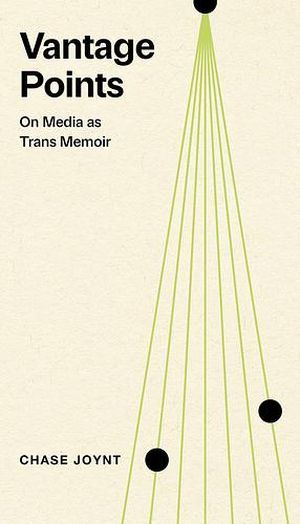This content contains affiliate links. When you buy through these links, we may earn an affiliate commission.
I love a book that plays with genre, I love Arsenal Pulp Press, and I love trans lit, so when this book arrived on my doorstep, I knew it was likely to become a favorite. But even with my high expectations, it still surprised me. I ended up reading it in one day because every time I put it down, I immediately wanted to pick it back up again (and did). If you’re looking for something unusual and beautiful, thought-provoking and funny, tender and smart, and, most of all, if you love a book that feels like a work of art—this unconventional memoir is for you.

Vantage Points: On Media as Trans Memoir by Chase Joynt
In this impossible-to-classify work of nonfiction, trans writer, filmmaker, and critic Chase Joynt uses text and images to explore memory, masculinity, forms of language, archival violence and memory, the history of media, pop culture, and more. At its most basic, this is a memoir about childhood sexual abuse told through the lens of the work of Canadian media critic Marshall McLuhan. After learning of a surprising family connection to McLuhan, Joynt begins digging into a variety of archives: McLuhan’s work, public historical archives, family archives, and his own personal archive of memory.
Joynt often quotes McLuhan, alongside many other thinkers and artists. The book contains lists, photographs, abstract art, diagrams, letters, maps, and lots of unusual formatting. There is no resolution and few answers. Joynt is interested in the ways he has been, knowingly and unknowingly, shaped by masculinity. He’s interested in how language creates meaning, in the violence it can do and the refuge it can make. He’s interested in how transness is portrayed in the media, and also how transness—and other kinds of queer identity and expression—makes media.
And through all of this, he is trying to make sense of—or perhaps make (un)sense of, his own trauma. There’s a way in which this book feels like both a public and private reckoning. It is systemic: Joynt is always thinking about how his life and family, and even the way he thinks, is connected to much larger systems. But it is also full of intimate details—heartbreaking, poignant, specific.
Joynt constantly questions his own process and motivations. Why is he writing this story? Whose story is it? What is it doing? What does he want it to do? How does it intersect with other media, with the colonial history of Canada, with trans memoir as a “genre”? This book is a record; it both hides and makes visible. I loved thinking through and with it. I love how visible the grappling is. It’s structured as process, as unfinished, as journey rather than arrival. Joynt makes so many connections and associations. His curiosity is unending, and he invites his readers into that curiosity. This is the kind of reading experience I’m always chasing: challenging but not alienating, both intellectual and emotional, and with lots of threads for me to keep following long after I’ve finished the book.
Read This Book
One book recommendation to help you cut through the noise

